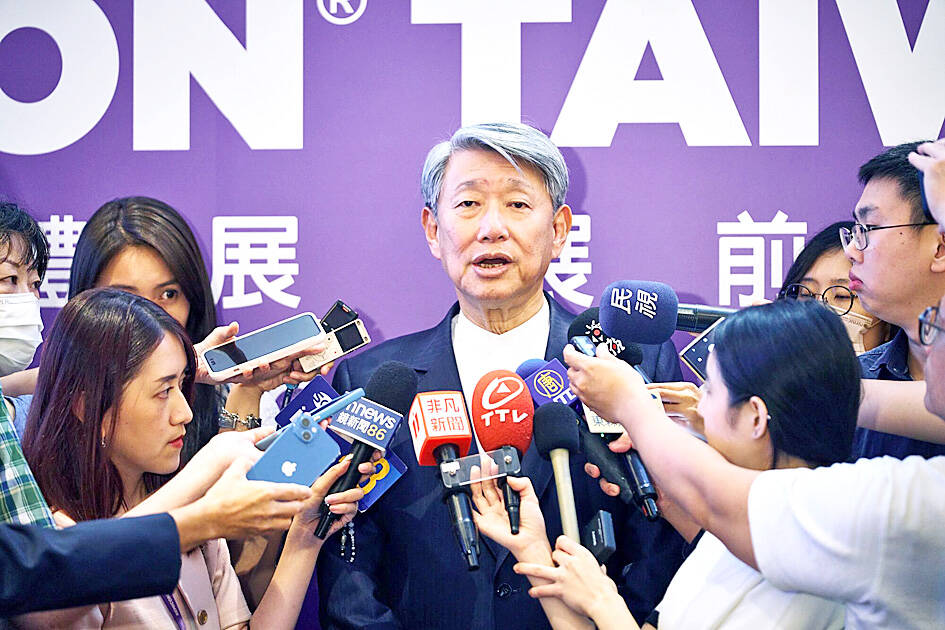Minister of Economic Affairs J.W. Kuo (郭智輝) yesterday said Taiwan’s government plans to set up a business service company in Kyushu, Japan, to help Taiwanese companies operating there.
“The company will follow the one-stop service model similar to the science parks we have in Taiwan,” Kuo said. “As each prefecture is providing different conditions, we will establish a new company providing services and helping Taiwanese companies swiftly settle in Japan.”
Kuo did not specify the exact location of the planned company but said it would not be in Kumamoto, the Kyushu prefecture in which Taiwan Semiconductor Manufacturing Company (TSMC, 台積電) has a fab and is preparing to build another one.

Photo: An Rong Xu, Bloomberg
Different prefectures in Kyushu are offering different incentives for foreign companies, "so the service company we set up will help organize the information and facilitate the 'localization' of Taiwanese enterprises," Kuo said.
Nagasaki, Oita, Miyazaki, and Kitakyushu are some of the Kyushu prefectures that have expressed interest in welcoming Taiwanese companies, he said.
Currently, the plan is limited to Kyushu, he said in response to a question on whether other Taiwanese one-stop service centers will be set up in Japan in the future.
Photo: Grace Hung, Taipei Times
"For other areas such as Kansai and Kanto, it would depend on the nature of the local industries, as most of the Taiwanese companies currently in Japan are part of the supply chain [for the semiconductor industry]," Kuo said.
Asked about a report that TSMC was planning to build a third fab in Japan, Kuo said that question should be directed to the company.
A Japanese media outlet on Sunday quoted Kuo as saying that TSMC would build a third fab in Japan to produce leading-edge chips after 2030.
Kuo, who was doorstepped by reporters ahead of a news conference for this week’s Semicon Taiwan exhibition, also pushed back at criticism of Taiwan by US Republican presidential nominee and former president Donald Trump, and denied that Taiwan took the US chip industry.
“Of course Taiwan is not stealing the chip industry from the US,” Kuo told reporters in Taipei. “The chips we made are commissioned by US companies, which still have the highest gross margin. Trump might have some misunderstanding on such matters, and we will clarify that.”
Trump rattled Taiwan officials and the country’s markets with comments published on July 16 in Bloomberg Businessweek that criticized Taiwan over its chip sector and urged it to pay the US for protection.
That has raised fears that if Trump succeeds US President Joe Biden, who has repeatedly said the US would defend Taiwan from a Chinese attack, he would be less committed, viewing Taiwan in transactional terms.
“Taiwan took our chip business from us,” Trump said at the time. “I mean, how stupid are we? They took all of our chip business. They’re immensely wealthy.”
Since Trump’s comments, Taiwanese officials have tried to talk up the nation’s efforts to uphold its part of the relationship.
In response to Trump’s call for Taiwan to “pay” the US for protection, Premier Cho Jung-tai (卓榮泰) said the country has increased defense spending and extended the conscription period.
“It’s our shared responsibility and goal to maintain the peace and stability in the Taiwan Strait and the Indo-Pacific region,” Cho said on July 17.

A proposed 100 percent tariff on chip imports announced by US President Donald Trump could shift more of Taiwan’s semiconductor production overseas, a Taiwan Institute of Economic Research (TIER) researcher said yesterday. Trump’s tariff policy will accelerate the global semiconductor industry’s pace to establish roots in the US, leading to higher supply chain costs and ultimately raising prices of consumer electronics and creating uncertainty for future market demand, Arisa Liu (劉佩真) at the institute’s Taiwan Industry Economics Database said in a telephone interview. Trump’s move signals his intention to "restore the glory of the US semiconductor industry," Liu noted, saying that

On Ireland’s blustery western seaboard, researchers are gleefully flying giant kites — not for fun, but in the hope of generating renewable electricity and sparking a “revolution” in wind energy. “We use a kite to capture the wind and a generator at the bottom of it that captures the power,” said Padraic Doherty of Kitepower, the Dutch firm behind the venture. At its test site in operation since September 2023 near the small town of Bangor Erris, the team transports the vast 60-square-meter kite from a hangar across the lunar-like bogland to a generator. The kite is then attached by a

Foxconn Technology Co (鴻準精密), a metal casing supplier owned by Hon Hai Precision Industry Co (鴻海精密), yesterday announced plans to invest US$1 billion in the US over the next decade as part of its business transformation strategy. The Apple Inc supplier said in a statement that its board approved the investment on Thursday, as part of a transformation strategy focused on precision mold development, smart manufacturing, robotics and advanced automation. The strategy would have a strong emphasis on artificial intelligence (AI), the company added. The company said it aims to build a flexible, intelligent production ecosystem to boost competitiveness and sustainability. Foxconn

Leading Taiwanese bicycle brands Giant Manufacturing Co (巨大機械) and Merida Industry Co (美利達工業) on Sunday said that they have adopted measures to mitigate the impact of the tariff policies of US President Donald Trump’s administration. The US announced at the beginning of this month that it would impose a 20 percent tariff on imported goods made in Taiwan, effective on Thursday last week. The tariff would be added to other pre-existing most-favored-nation duties and industry-specific trade remedy levy, which would bring the overall tariff on Taiwan-made bicycles to between 25.5 percent and 31 percent. However, Giant did not seem too perturbed by the